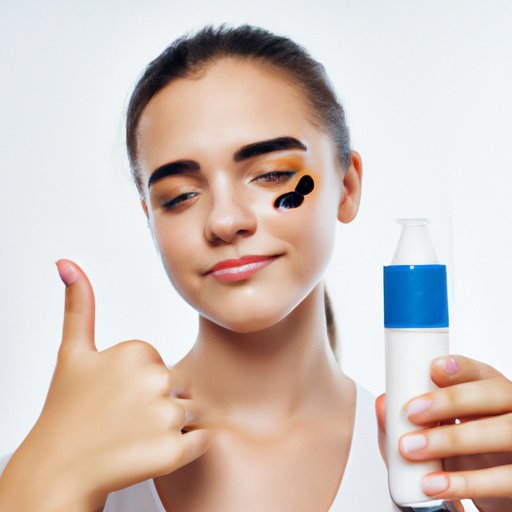Introduction
Acne is one of the most common skin conditions in the world. It affects people of all ages, genders, and skin types. While there are a variety of treatments available, many people are looking for natural ways to clear their acne. One option that has been gaining popularity recently is tanning. But does tanning actually help clear acne? In this article, we’ll explore the evidence to find out.
Examining the Evidence: Does Tanning Help Clear Acne?
The scientific evidence on the effects of tanning on acne is limited. Most of the studies have looked at the use of artificial tanning beds or sun exposure, rather than natural tanning.
What Studies Say
A 2010 study examined the effects of artificial tanning on acne. The researchers found that after 12 weeks of tanning sessions, participants had significantly less acne than before. Another study from 2011 showed that ultraviolet light from tanning beds can reduce inflammation associated with acne lesions.
Benefits of Tanning for Acne Sufferers
Aside from reducing inflammation and acne lesions, tanning may offer other benefits to acne sufferers. Some people find that tanning helps to even out their skin tone, making it look healthier and more vibrant. Additionally, tanning can boost your mood and confidence, which can make living with acne easier.
The Pros and Cons of Tanning for Acne Sufferers
When considering whether to use tanning as an acne treatment, it’s important to weigh the pros and cons.
Pros
The main benefit of tanning for acne sufferers is that it can reduce inflammation and acne lesions. Additionally, it can improve your mood and self-confidence, and even out your skin tone.
Cons
While tanning can offer some benefits for acne sufferers, there are also potential risks to consider. Tanning increases your risk of skin cancer, premature aging, and sunburn. Tanning beds also emit UV radiation, which can be damaging to your eyes.
A Dermatologist’s Perspective on Tanning and Acne
Most dermatologists do not recommend tanning as a way to treat acne. While some studies have shown that tanning can reduce inflammation and acne lesions, the risks involved are too great to justify its use.
What Dermatologists Recommend
Dermatologists generally recommend using topical treatments such as benzoyl peroxide or salicylic acid to treat acne. These products can reduce inflammation and clear up acne without the risks associated with tanning. Additionally, they can be used safely over long periods of time.
Possible Side Effects of Tanning
In addition to the risks of skin cancer and premature aging, there are other potential side effects of tanning. These include eye irritation, dehydration, dizziness, and nausea. People who have sensitive skin may also experience rashes or itching after tanning.
Tanning: Is it a Safe Way to Treat Acne?
Given the risks involved, it’s clear that tanning is not a safe way to treat acne. While some studies have shown that it can be effective in reducing inflammation and acne lesions, the risks outweigh the benefits.
Possible Risks of Tanning
Tanning can increase your risk of skin cancer, premature aging, sunburn, eye irritation, dehydration, dizziness, and nausea. Additionally, people with sensitive skin may experience rashes or itching after tanning.
Alternatives to Tanning for Treating Acne
If you’re looking for a safe and effective way to treat acne, there are several alternatives to consider. Topical treatments such as benzoyl peroxide or salicylic acid are widely recommended by dermatologists. Additionally, lifestyle changes such as eating a healthy diet and exercising regularly can help reduce acne flare-ups.
Conclusion
In conclusion, tanning is not a safe or recommended way to treat acne. While it may reduce inflammation and acne lesions, the risks associated with tanning outweigh the benefits. For those looking for a safe and effective way to treat acne, topical treatments and lifestyle changes are the best options.


